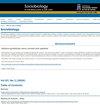A Sustainable Technique for Colony Multiplication by Eduction of Wild Nests of the Stingless Bee Tetragonula iridipennis Smith
IF 0.6
4区 农林科学
Q4 ENTOMOLOGY
引用次数: 0
Abstract
Colony multiplication of stingless bees, Tetragonula iridipennis, largely relies on the eduction of wild colonies from their natural nesting sites in India. During the hiving of wild colonies, colonies were destroyed with the loss of robust wild foragers and built-in storage reserves over the years. The present study was conducted to devise a technique to sustainably multiply the colonies of stingless bees from the wild colony and the colony establishment and development during the eduction process. The annexure hives provided for eduction were accepted in a shorter time (3.25 ± 1.18 days), with the construction of storage pots observed at 7.75 ± 1.59 days after hive acceptance by the bees. The movement of foragers between the wild colony and the annexure hives was noticed for 13.80 ± 4.20 days. The foragers settled in the annexure hives and started foraging after 18.20 ± 2.49 days. The advancing fronts were observed at 26.67 ± 2.58 days after the addition of the laying queen in the established annexure hives. There was a significant increase in the number of inhive workers after the queen seeding in the annexure hives. This technique is the easiest and most sustainable non-destructive way of multiplication of stingless bee colonies without loss in viability of the perennial wild colony.无刺蜜蜂野生巢的可持续繁殖技术研究
无刺蜜蜂的群体繁殖在很大程度上依赖于野生蜂群从它们在印度的自然筑巢地迁移出来。在野生蜂群的筑巢过程中,随着多年来强壮的野生觅食者和内置储存储备的丧失,蜂群被摧毁了。本研究旨在设计一种野生无刺蜂群体可持续繁殖的技术,并在繁殖过程中建立和发展无刺蜂群体。在较短的时间内(3.25±1.18 d)接受了提供教育的附属蜂箱,在蜂箱接受后(7.75±1.59 d)观察到储罐的建造。采集蜂群在野外蜂群和附设蜂箱之间移动的时间为13.80±4.20 d。采集者于18.20±2.49 d后进入附属蜂箱,开始采食。在已建立的附属蜂房中加入产蛋蜂王后的26.67±2.58天观察到前进的锋面。蜂王在附属蜂箱中播种后,抑制工蜂的数量显著增加。该技术是最简单和最可持续的非破坏性繁殖无刺蜂群的方式,而不会损失多年生野生蜂群的生存能力。
本文章由计算机程序翻译,如有差异,请以英文原文为准。
求助全文
约1分钟内获得全文
求助全文
来源期刊

Sociobiology
生物-昆虫学
CiteScore
1.60
自引率
11.10%
发文量
28
审稿时长
3 months
期刊介绍:
SOCIOBIOLOGY publishes high quality articles that significantly contribute to the knowledge of Entomology, with emphasis on social insects. Articles previously submitted to other journals are not accepted. SOCIOBIOLOGY publishes original research papers and invited review articles on all aspects related to the biology, evolution and systematics of social and pre-social insects (Ants, Termites, Bees and Wasps). The journal is currently expanding its scope to incorporate the publication of articles dealing with other arthropods that exhibit sociality. Articles may cover a range of subjects such as ecology, ethology, morphology, population genetics, physiology, toxicology, reproduction, sociobiology, caste differentiation as well as economic impact and pest management.
 求助内容:
求助内容: 应助结果提醒方式:
应助结果提醒方式:


